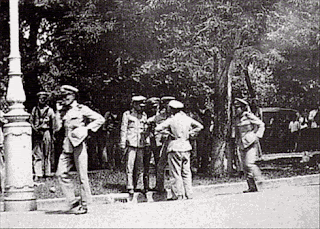Monday, 20 June 2011
Dara Rasami: Princess of Chiang Mai and Consort to King Chulalongkorn
Dara Rasami was born in Chiang Mai on August 26, 1873, to King Inthawichayanon and Queen Thipkraisorn Rajadevi. She later became princess consort to King Chulalongkorn (Rama V). She played an influential role in shaping the perceptions of Chiang Mai identity within the Siamese palace, and served as both hostage and diplomat for her home kingdom. The following images are from the National Archives of Thailand, Bangkok. I discovered them through the excellent dissertation: A “Foreign”Princess in the Siamese Court: Princess Dara Rasami, the Politics of Gender and Ethnic Difference in Nineteenth-Century Siam, by Leslie Ann Woodhouse. The full text is available for download on Scribd.
Labels:
Thai Women
Wednesday, 8 June 2011
King Prajadhipok: Moments in the Life of a Monarch
King Prajadhipok was the seventh king of the current Chakri dynasty. He became king after the original heir to the throne died unexpectedly in 1925. With only a year's experience of statecraft under his belt, he embarked, somewhat precariously, on his career as king of Siam. But King Prajadhipok was never entirely happy being an absolute monarch, upon whose shoulders the success of an entire nation stood. At heart, he was a creative spirit and would dedicate much of his time to reading, composing music, and making amateur movies. These photos show us King Prajadhipok the man: a dedicated husband and educator of children.
Labels:
King Prajadhipok
Monday, 6 June 2011
Siamese Coup d’État of 1932
The Siamese Coup d’État of 1932 brought about the end of absolute monarchy and created the first constitutional monarchy under King Prajadhipok (Rama VII). Read about the coup that changed Siam forever on my other blog, Faraang.
 |
| Mano addressing the gathered crowd at the Throne Hall |
 |
| Crowd gathered outside Ananta Samakhom Throne Hall |
 |
| Phraya Songsuradet |
 |
| Phibun |
 |
| Pridi |
 |
| Prince Paribatra |
 |
| The Constitution |
Labels:
Coup d'Etat
Sunday, 5 June 2011
King Mongkut
King Mongkut was the fourth king of the Chakri dynasty and reigned from 1 April 1851 – 1 October 1868. He is famous as the king who invited Anna Leonowens to teach English to his children and concubines. Anna Leonowens wrote various books about her time in Siam, the authenticity of which is questioned by many scholars. In her books, she claimed that King Mongkut would vary between a despotic madman and a kind and compassionate ruler. Under his rule, westerners gained valuable trading agreements with Siam, though he had a notoriously bad relationship with the French. He was a king with one foot in the future and one foot in the past, unlike his successor - Rama V - who was to abolish prostration and open the flood gates of westernization. King Mongkut also served as a Buddhist monk for 27 years - before becoming king - and dedicated his time to scholarly pursuits. He was known for his excellent command of English and could also speak Sanskrit.
Labels:
King Mongkut
Saturday, 4 June 2011
The Last Moments of Life
Three images of criminals being beheaded. Before they executioner would decapitate the convicted, an elaborate ritual was performed. Once the executioner believed that the criminal was at peace with himself, he would swoop down from behind and slice of the head. Many executioners would then go to the temple to make merit.
Labels:
execution
Friday, 3 June 2011
Siamese Elephants
Elephants are venerated by Thai people both as symbols of the nation and spiritual guardians. They have long been associated with royalty, and white elephants were sought after by Thai kings as it was believed they brought good luck. They have served as beasts of burden and in battle against neighboring countries throughout Thailand's turbulent history.
Labels:
Elephants
Subscribe to:
Comments (Atom)

















































